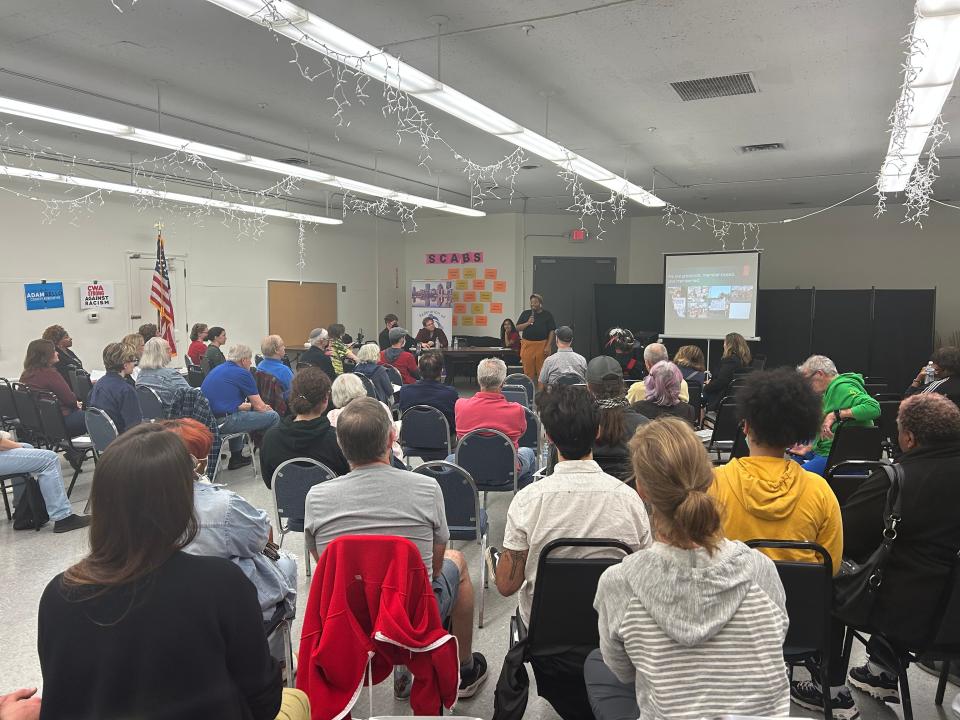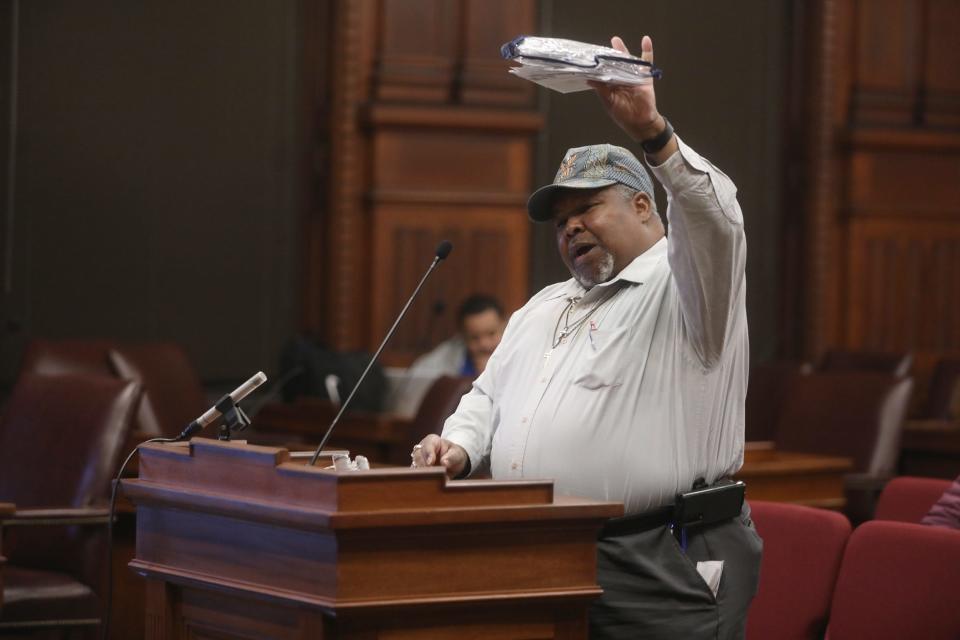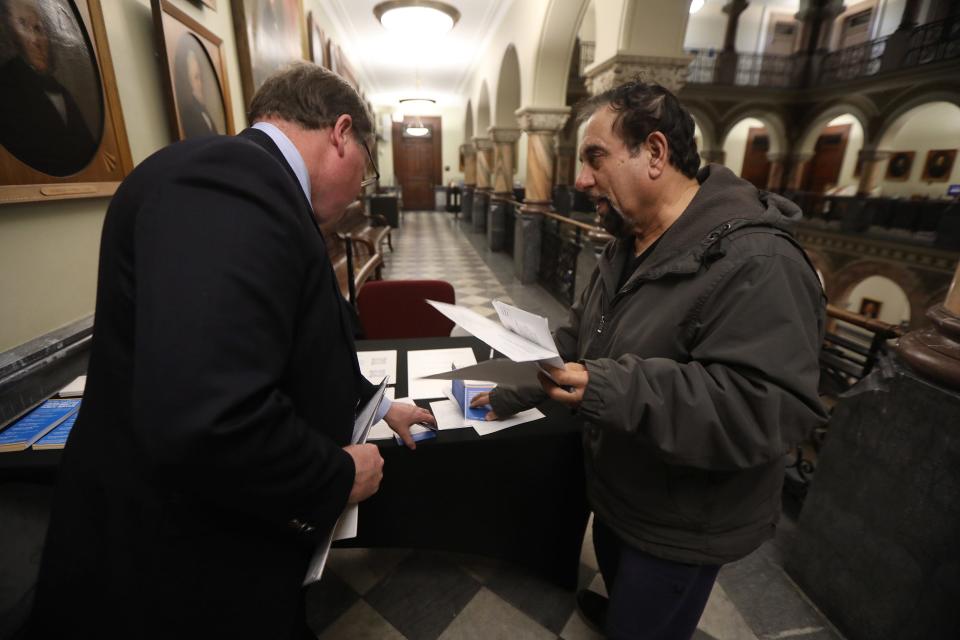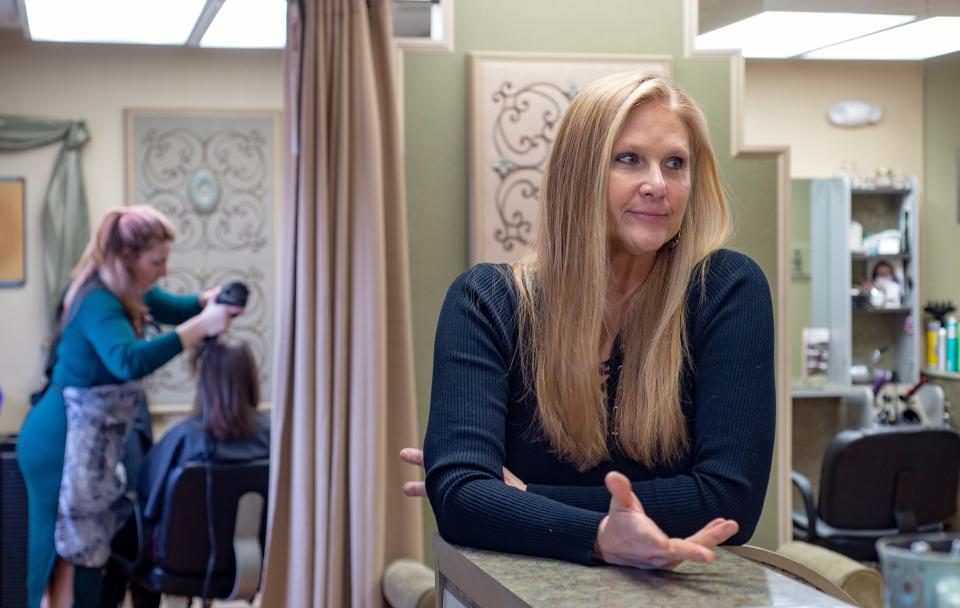How Rochester's push for public power points to larger outcry over NY utility woes
Julia Acosta never knows when she'll get a $2,000 utility bill in the mail.
Rochester Gas & Electric (RG&E) sends her a bill whenever it wants, Acosta, of Henrietta, says, billing her for several months at a time for amounts she's not sure are accurate.
"Every month, we live in fear that they're going to cut our power," Acosta said.
Acosta's not alone. Dozens of frustrated RG&E customers filled the Federation of Social Workers Hall in Rochester Oct. 25 to share their experiences with the utility company, which spanned from unexpected and expensive bill increases to difficulties connecting with someone who could help them resolve their billing issues.
These problems also aren't new either. A handful of forums held by the state's Department of Public Service earlier this year brought forward many complaints against RG&E and its sister company NYSEG, whose parent company is Avangrid. Other utilities throughout the state, such as Central Hudson and Con Edison, are also facing pushback for billing issues and rate hikes requested in recent months.
And more than 200,000 NYSEG and RG&E customers were 60 days behind on their energy bills at the end of August, a total of over $145 million owed to the utilities, according to an analysis by AARP and the Public Utility Law Project (PULP.)
But members of grassroots organization Metro Justice are proposing a potential solution to those problems in the Rochester area: turning RG&E into a public utility.

Metro Justice: How residents will benefit from public power
The Rochester for Energy Democracy, or RED, campaign is a push for lower utility rates for Rochester and Monroe County residents by way of making RG&E a public utility, Metro Justice organizers explained during the October forum.
Here's how Metro Justice representatives are saying residents will benefit from the change:
Affordable: Public utilities are not-for-profit and between 13-63% cheaper than investor-owned utilities.
Local: Currently, RG&E is owned by Spain-based Iberdrola. A public utility would bring local union jobs to the area.
Accountable and democratic: The proposed Monroe County public utility would be governed by an elected board of directors representing wide array of community interests.
Reliable: With less than half the outage time of investor-owned utilities, public power is more reliable, Metro Justice claims in its materials.
Renewable: The proposed public utility aims to be 100% carbon-free by 2030.
Equitable: Through Metro Justice's proposed public utility, current RG&E employees would be retained and the transition process would involve local workforce development, union leadership and be made accessible for the whole community.
However, RG&E representatives say otherwise.
"They did public power in Long Island. It was a disaster and those people now pay the highest rates in the state and some of the highest rates in the country," said Selby Cohen, Avangrid's senior manager of corporate communications New York Shelby Cohen. "(Public power) puts taxpayers on the hook for millions of dollars because you have to acquire the assets of the utility in order to make this work."

Rochester's push for public power amid growing outcry over utility costs
The frustrations voiced in Rochester have echoed across the state over the past year as customers contend with outdated billing systems and error-riddled new ones that have led to overcharges, late bills and mysterious deductions from checking accounts.
Customer complaints surged at Central Hudson after the utility rolled out an $88 million billing system in 2021. Thousands of customers were double billed and overcharged, an investigation by the Public Service Commission (PSC) found.
Over the summer the utility, with some 400,000 gas and electric customers in the Hudson Valley, asked the PSC to approve increases of 16% for electric use and 19% for gas. Its last rate plan, approved in 2021, had 2.5% increases for electric and nearly 4% for gas.
Central Hudson says the increases will cover the cost of the pivot to a greener grid and replacement of aging poles, power lines and transformers to deal with the steady drumbeat of high-intensity storms. Roughly 20% of its infrastructure is at the end of being useful.
And this summer, the PSC approved ConEd’s rate plan, which includes increases of 12% for electric and nearly 19% for gas over three years. ConEd serves 3.6 million gas and electric customers in New York City and Westchester County.

NYSEG and RG&E officials have made similar claims as they make the case for higher rates.
The Avangrid-owned utilities have plans to spend $2.1 billion on upgrades for their 1.7 million customers. Funding would go to replace poles, wires and substations and trim trees.
Last month the PSC approved NYSEG rate hikes of 22.1% for electric and 6.1% over three years. For RG&E, it approved a 16% increase for electric and 10.9% for gas over three years.
NYSEG and RG&E also said they have begun addressing their customers' concerns, including hiring more call center and meter reading employees, increasing employee training efforts and holding dozens of community events to help customers with billing issues, according to Cohen, Avangrid's spokesperson.
NYSEG, RG&E rate hikes approved: Here's what it means for customers
Ratepayer advocates say they haven’t seen requests this high in more than a decade and the rate hikes sought by utilities threaten a new crisis.
“We had an arrears crisis that they (state officials) took care of,” said Bill Ferris, the AARP’s New York state legislative representative. “They did a really good job but now we’re facing an affordability issue in New York. And it’s getting worse because the utilities are coming in and charging more rates.”

Ferris says what while AARP supports the state’s climate goals, ratepayers shouldn’t get stuck with the full tab.
“It should not be paid for within rate cases and that’s what’s happening right now,” Ferris said. “These costs should be spread out by all New Yorkers.”
Save on your winter heating bill: See if you qualify for NY's HEAP program
What will it take to make the switch to public power?
Steps have already been taken to kickstart the process toward making RG&E a public utility.
Rochester City Council committed up to $500,000 in June for a feasibility study of a public takeover of RG&E, which organizers said is the first necessary move and will help determine the technical, economic, social, environmental and governance aspects of the switch.
Overall, Metro Justice is asking for $1.5 million to complete the study, according to the campaign's organizer and policy specialist Michelle Wenderlich. Organizers made a push to receive the remaining $1 million from the Monroe County Legislature during their Nov. 14 meeting but the allotment was voted down, 12-17.
However, Metro Justice says they will continue to find a way to fund and commission a study.
NYSEG, RG&E billing issues: A $345 utility bill became $68,000 as NYSEG, RG&E confront billing fiasco
If the organization is eventually allotted the funds, Monroe County and the city of Rochester will then need to form an intermunicipal agreement to commission the study, and the terms of the study process will have to be voted on by both governments, according to Metro Justice.
Once the study is completed, a referendum passed by city council and county legislature would go to the public for a vote.
If voters greenlight a public takeover, that would compel RG&E to sell its infrastructure to the community, organizers say, and the cost of purchasing the utility will be paid off over time through the rates themselves, not through taxes.
"Despite (the legislature's) objections that the process moved too fast, finding a solution to the RG&E crisis cannot come fast enough for many Monroe County residents, who face shut offs and concerns about the accelerating climate crisis," Metro Justice members said in a written statement.
"We look forward to winning a study, and proceeding with a referendum for a public utility once a study is completed. The public wants an alternative to the multinational corporate mismanagement of RG&E and we are going to keep fighting until we get it."
Emily Barnes is the New York State Team consumer advocate reporter for the USA TODAY Network. Contact Barnes at ebarnes@gannett.com or on Twitter @byemilybarnes.
This article originally appeared on Rochester Democrat and Chronicle: Rochester group pushes for public power as utility anger rises in NY

